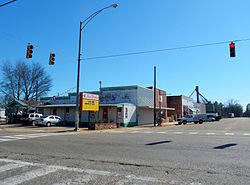2000 census
As of the census [9] of 2000, there were 804 people, 344 households, and 226 families residing in the town. The population density was 204.8 inhabitants per square mile (79.1/km2). There were 462 housing units at an average density of 117.7 per square mile (45.4/km2). The racial makeup of the town was 74.38% White, 24.50% Black or African American, 0.62% Native American, 0.12% from other races, and 0.37% from two or more races. 0.50% of the population were Hispanic or Latino of any race.
There were 344 households, out of which 27.9% had children under the age of 18 living with them, 49.4% were married couples living together, 12.2% had a female householder with no husband present, and 34.3% were non-families. 33.7% of all households were made up of individuals, and 18.9% had someone living alone who was 65 years of age or older. The average household size was 2.34 and the average family size was 2.98.
In the town, the population was spread out, with 25.7% under the age of 18, 6.5% from 18 to 24, 24.0% from 25 to 44, 22.1% from 45 to 64, and 21.6% who were 65 years of age or older. The median age was 41 years. For every 100 females, there were 87.9 males. For every 100 females age 18 and over, there were 84.3 males.
The median income for a household in the town was $27,500, and the median income for a family was $36,339. Males had a median income of $29,821 versus $18,393 for females. The per capita income for the town was $15,248. About 12.3% of families and 18.0% of the population were below the poverty line, including 24.0% of those under age 18 and 18.6% of those age 65 or over.











